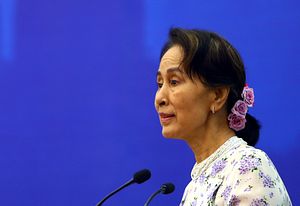Myanmar recently had a major call for outside business investment at the Invest Myanmar Summit. The injection of outside capital could serve as a productive push for an improvement in humanitarian conditions, but not if human rights issues are glossed over at the onset.
“I stand here to reaffirm our commitment to continue our reform and to build an investment-friendly environment,” Aung San Suu Kyi, the country’s de facto leader and state counselor said at the summit, a first-of-its-kind showcase for international investors.
Notably, Aung San Suu Kyi never addressed the Rohingya crisis in Rakhine state. In fact, it only received a passing mention by a Rakhine state official who said, “the crisis happened in a small part of the state,” and the state therefore is “open for business to the world.”
Meanwhile, there are more than 700,000 Rohingya refugees who have fled from Rakhine to Bangladesh since August 2017. Long subject to discrimination and isolated in Burmese society, the Rohingya — a Muslim ethnic minority group—have been subjected to mass atrocities by the Myanmar military. In the process, the Rohingya lost their homes and lands where they have lived for generations. In 2018, the United Nations described the Rohingya situation as the “world’s fastest growing refugee crisis” and the military offensive in Rakhine as a “textbook example of ethnic cleansing.”
Given this context, it’s troubling that Aung San Suu Kyi’s government would invite foreign investment into Rakhine without properly acknowledging the political situation or pursuing solutions to resolve it by guaranteeing the Rohingya’s safe and dignified return home. The reality is that Myanmar has had little incentive to right its wrongs.
China, infamous for circumventing international human rights statutes, has injected billions of dollars into Rakhine through a special economic zone partnership. Beijing has been eager to exploit Myanmar’s strategic coastal location and rich natural resources by developing a deep-sea port, oil and gas pipelines, and an industrial park.
These China-led development projects are bad for Rakhine’s human rights situation because it’s unlikely that Beijing will do anything to help the Rohingya. History has shown us as much. The horrific treatment of ethnic minorities including the Uyghurs – a largely Muslim ethnic minority group detained in a network of internment camps in Xinjiang— can attest to that.
This is an opportunity for responsible businesses enticed by Suu Kyi’s call for investment to be upstanding global citizens. Morally it is the right thing to do, but it also makes economic sense. Companies doing business with a country that grossly ignores a human rights crisis are more likely to have economic sanctions placed on them.
The business community can leverage the government’s desire for foreign capital by tying investment to more inclusive and supportive policies of Myanmar’s minority ethnic groups – including the Rohingya. They should send a clear message that if the state is not safe for all its peoples, it is not safe enough for business either and that the “investment-friendly environment” they are trying to foster will be unachievable without reaching this milestone.
There is great historical precedent for the idea. In the 1970s, the international business community showed it could be a force for good in Apartheid-era South Africa. The Sullivan Principles were drafted in 1977 by an African-American minister, Rev. Leon Sullivan. They set guidelines for foreign companies doing business in South Africa and were widely adopted by multinationals operating in the country. Many American businesses, including GM, committed to provide fair employment and equal treatment for all, regardless of race. During the 1980s, at least 160 of the 300 American-owned companies in South Africa voluntarily adopted the Sullivan Principles, promoting democracy and economic empowerment in the country.
Businesses can not only improve the economy of a transitional society but also can contribute to human rights situation in the country. Myanmar would benefit from an adaptation of the Sullivan Principles.
History shows that Aung San Suu Kyi won’t advocate for the Rohingya, Rakhine state officials won’t advocate for the Rohingya, and China won’t advocate for the Rohingya. Perhaps a principled business community can advocate for them and provide the Rohingya with a new opportunity for lasting peace and prosperity.
Jieun Pyun is senior program manager of the George W. Bush Institute Human Freedom Initiative.

































